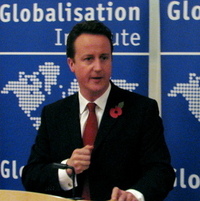Europe: David Cameron’s Achilles Heel

The second week of Britain’s General Election campaign ended with many commentators – and even more voters – yawning and complaining that this is fast becoming the most boring General Election in memory. Earlier in the week, I slipped quietly into the back of meeting in my home town of Buckingham to listen to the virulently anti European Union leader of the UK Independence Party, Nigel Farage blame Brussels for this apparent non event.
According to Farage the real reason why none of the main parties appear willing to address any of the real issues of concern to the average Briton, whether it be Britain’s yawning deficit, immigration, defence or the great Elephant in the room – the European Union and the Single Currency, is because the British Parliament has surrendered most of its powers to the Parliament in Brussels. This claim is one that used to be made with much vigour by the Conservative Party and before them in the 1970s and 1980s, by the Labour Party, which at one time advocated withdrawal from the then Common Market altogether.
There is a rule of thumb that the governing party in Britain tends to be reasonably pro European, while the Opposition makes much of the surrender of British sovereignty, and takes a more hostile stance. The question is, will this change if David Cameron is elected Prime Minister in a few weeks time? Fordespite his silence – which some argue is tactical – many in his party hope that once in power the Conservatives will make it their business not to surrender any more powers to Brussels. On current form, they could be whistling in the dark. For both Gordon Brown and David Cameron promised a referendum on the hugely contentious issue of the Lisbon Treaty, which solidified many of the European institutions, gave the European Union a President of sorts and moved Europe much closer to having a common Foreign and defence policy. Since Cameron was not Prime Minister, he could claim that delivering on that promise of a refrendum was not in his power. But few in his party believe he will want a referendum on the Treaty now it has been ratified. And so many on the British Right accuse him of ‘betrayal’.
Yet there is another reason why David Cameron and the Conservative Party would rather not discuss the EU during this election. While there are plenty of Euro sceptic votes to be had – for the British public has become increasingly hostile to the institution – Cameron and his Front Bench are anxious to avoid yet another full blown row over their distinctly odd alliances with far Right wing parties in the European Parliament, as this might take votes away.
Just over a year ago – and on assignment with Aljazeera English TV – I chanced across a senior Conservative, Eric Pickles getting on the same plane at Warsaw airport, brief case in hand. Intrigued, and since many year before, the quite portly Mr Pickles had offered me a ‘sticky bun’ when we met to discuss local government, I asked him what he was up to. And since Mr Pickles couldn’t really explain what he had been up to, and I subsequently checked – he had been meeting with Michael Kaminski of the far Right Polish Law and Justice Party – I have kept an eye on his activities ever since. For the British Conservatives have left the mainstream centre Right European Peoples Party, which is the largest grouping in the European Parliament, and instead teamed up with the smaller Euro sceptic European Conservatives and Reformists. This group not only includes Kaminski’s party, which has been accused of anti-Semitism by the British Foreign Minister (a charge denied), but also includes Robert Ziles Latvian party, ‘For Fatherland and Freedom’. Embarrassingly for both Mr Cameron and Mr Pickles, some members of this grouping have joined commemorative marches organised by retired members of the old Latvian division of the Waffen SS.
Last year the Obama administration made clear its concern at the British Conservative Party’s links with these parties, while George Schwaub of the National Committee on American Foreign Policy and a Holocaust survivor said; “I think Winston Churchill would be turning in his grave”.
The Conservatives have hit back at their Labour accusers, but their associations on a practical level leave them isolated within Europe, and distanced from natural allies from France and Germany. Which is why my hunch is that the Conservatives if they win under David Cameron will slowly edge back towards the mainstream European Peoples Party. For such is the depth of Britain’s economic malaise, no governing party will want to retreat to a form of isolationism that distances Britain both from Europe and potentially the United States.
In truth no political party now wants to be seen as too pro European, not even the notoriously Euro friendly Liberal Democrats, which is why the word ‘Europe’ has not passed the lips of any of them. Should Labour win on May 6th, or be obliged to go into coalition with the Liberal Democrats, it will most likely be business as usual with Europe, not least because the European political establishment knows that it has become deeply unpopular across the Continent and dare not push for much further integration now.
The question – still unanswered, is how David Cameron intends to play the Europe card if he wins office, because in office he will find it much more difficult to play his cards both ways.





